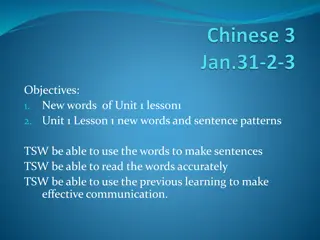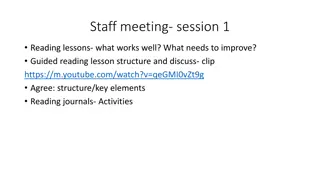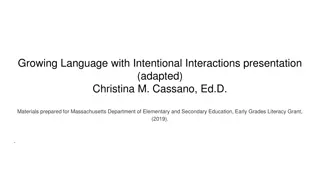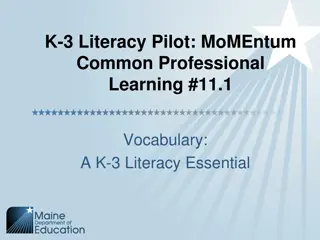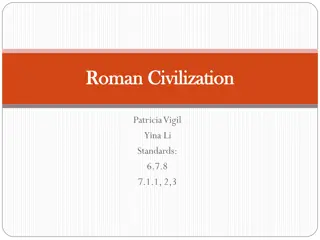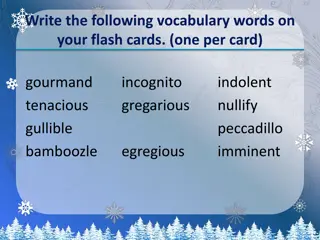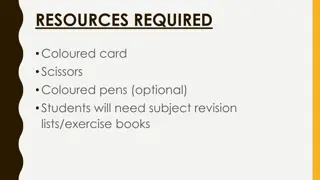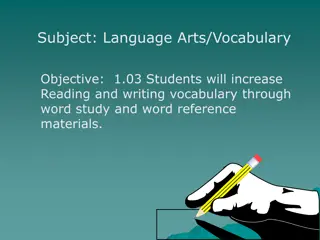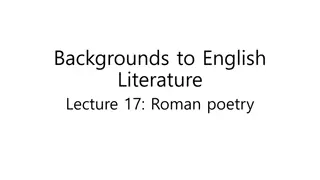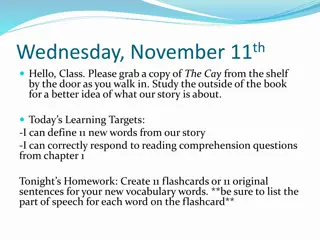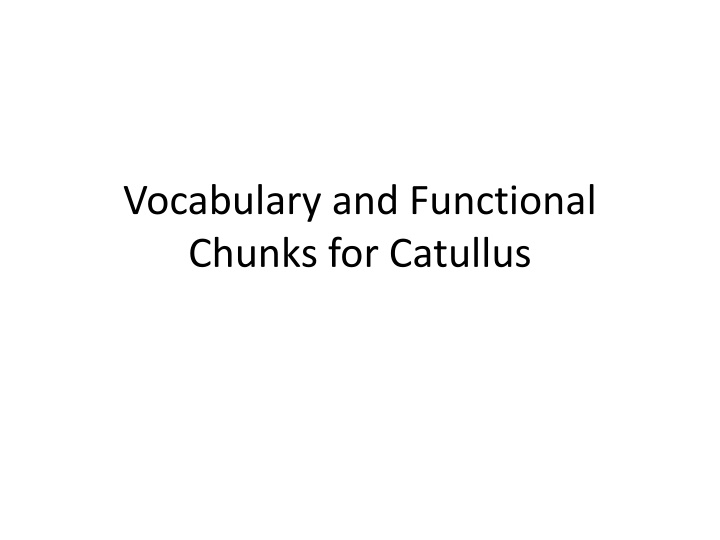
Catullus Vocabulary and Functional Chunks for Language Learners
Explore essential vocabulary and functional chunks from Catullus' works to enhance your understanding of poetic expressions. Dive into phrases like "arrive at these miserable funeral rites" and "forces a lover to love more" to enrich your language skills in a classical context.
Download Presentation

Please find below an Image/Link to download the presentation.
The content on the website is provided AS IS for your information and personal use only. It may not be sold, licensed, or shared on other websites without obtaining consent from the author. If you encounter any issues during the download, it is possible that the publisher has removed the file from their server.
You are allowed to download the files provided on this website for personal or commercial use, subject to the condition that they are used lawfully. All files are the property of their respective owners.
The content on the website is provided AS IS for your information and personal use only. It may not be sold, licensed, or shared on other websites without obtaining consent from the author.
E N D
Presentation Transcript
Vocabulary and Functional Chunks for Catullus
advenio has miseras inferias I arrive at these miserable funeral rites
amantem cogit amare magis forces a lover to love more Nota Bene: amantem is pres. part. substansive; magis is comp. adv.
amata nobis quantum amabitur nulla having been loved by us so much as no one will be loved Nota Bene: amata is perf. pass part; nobis is abl. agent w/o ab
at tu dolebis but you will be sad/ you will grieve
atque in perpetuum and into perpetuity Nota Bene: perpetuum is acc after in implying motion
aut quam sidera multa or as many as the stars
ave atque vale hail and farewell Nota Bene: imperative; ave elides to atque
Batti veteris sacrum sepulcrum the sacred tomb of old Battus
cui videberis bella to whom will you seem beautiful Nota Bene: video in pass. translates as seem
cuius esse diceris whose will you be said to be Nota Bene: i turns to e before the ris pass. pers. ending
cum rogaberis nulla when you will be asked by no one Nota Bene: rogaberis is 2nd pers fut pass; bi becomes be before r
cum tacet nox when the night is silent
cum ventitabas when you used to come often
cupido amanti to a desirous lover Nota Bene: amanti is pres part dat
desinas ineptire you should stop being a fool
dilexi tum te I loved you then
et nequiquam adloquerer and [so that] I might speak in vain to Nota Bene: ut is understood from previous phrase
et quod vides perisse perditum ducas and you should take as ruined that which you see has been ruined
etsi impensius uror even if I burn more eagerly Nota Bene: impensius is comp. adv.; uror is deponent
fraterno multum manantia fletu soaking much with brotherly tears Nota Bene: manantia is pres part acc pl obj of earlier imp; multum is adv; fraterno is adj abl mod fletu
fulsere quondam candidi tibi soles once the bright suns shone for you Nota Bene: fulsere is syncopated form of fulserunt; candidi soles is the subject
futivos hominum vident amores they see the secret loves of men
heu indigne frater adempte mihi alas brother having been undeservedly stolen from me Nota Bene: adempte ends in e b/c voc.; indigne ends in e b/c adv.; mihi translated here from me
iacet Cyrenis it lies in Cyrene
ibi illa multa cum iocosa fiebant when there those many humorous things were happening
in vento in the wind
iniuria talis such an injury
mi es vilior et levior you are cheaper and lighter to me Nota Bene: vilior and levior are comp. adj.; mi is syncopated form of mihi
miser Catulle miserable Catullus Nota Bene: Catulle is in voc.
mulier mea my woman
multa per aequora and through many seas Nota Bene: aequora is acc. pl. neut.
multas per gentes through many races
mutam cinerem the mute ash
nec mala fascinare lingua nor the evil tongue [able] to cast a spell Nota Bene: able is understood from previous phrase example of zeugma
nec miser vive don t live miserably Nota Bene: nec vive is neg. imper.
nec prae me velle tenere Iovem nor that you wanted to hold Jove before me Nota Bene: ind. state; velle as inf. in ind. st.; tenere as compl. inf.
nec quae fugit sectare don t pursue she who flees Nota Bene: nec sectare is neg. imper.
non si se Iuppiter ipse petat not if Juppiter himself should seek her
non tantum ut vulgus amicam not only as a common man [loves] his girlfriend Nota Bene: loves is understood from next statement, ex. of zeugma
nulli se dicit nubere malle she says she prefers to marry no one Nota Bene: ind. statement introduced with dicit with se as acc. subj., malle as inf. in ind. state., nubere as compl. inf. to malle, and nulli as spec. dat. following nubere
obdura endure Nota Bene: imperative
postremo munere mortis with the final gift of death Nota Bene: abl. abl. gen.
prisco quae more parentum which in the ancient custom of the parents Nota Bene: parentum is 3rd decl. gen. pl.
quae nec pernumare curiosi possint which neither the curious may be able to count Nota Bene: possint is pres. subj.
quae tibi manet vita what life remains for you
quae tu volebas which you were wanting Nota Bene: quae here is neut. acc. pl. referring back to humorous things
quaeris you ask Nota Bene: deponent verb; also requiris
quam magnus numerus harenae as great as the number of sand
quam mihi than me Nota Bene: mihi is dat. = dat. nulli to which it s being compared before the quam; quam requires nouns to be in same case

